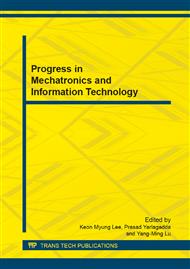p.452
p.458
p.462
p.466
p.472
p.476
p.483
p.487
p.491
Knowledge Based ε-Support Vector Regression Method
Abstract:
The classical regression systems modeling methods only consider the single scene, which has the weakness: partial information missing may weaken the generalization abilities of the regression systems constructed based on this dataset. A regression system with the Knowledge transfer learning abilities, i.e. Knowledge Based ε-Support Vector Regression (KB-ε-SVR for brevity) is proposed based on ε-support vector regression. KB-ε-SVR can use the current data information sufficiently, and learn from the existing useful historical knowledge effectively, so that remedy the information lack in the current scene. Reinforced current model is obtained through control the similarity between current model and history model in the object function and current model can benefit from history scene when information is missing or insufficient. Experiments show that KB-ε-SVR has the better performance and adaptability than the traditional ε-support vector regression methods in scenarios with insufficient data.
Info:
Periodical:
Pages:
472-475
Citation:
Online since:
November 2013
Authors:
Price:
Сopyright:
© 2014 Trans Tech Publications Ltd. All Rights Reserved
Share:
Citation:


